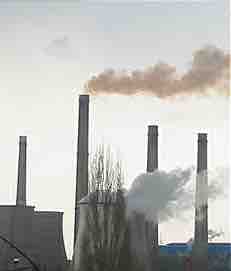Market failure occurs when the price mechanism fails to account for all of the costs and benefits necessary to provide and consume a good. The market will fail by not supplying the socially optimal amount of the good.
Prior to market failure, the supply and demand within the market do not produce quantities of the goods where the price reflects the marginal benefit of consumption. The imbalance causes allocative inefficiency, which is the over- or under-consumption of the good.
The structure of market systems contributes to market failure. In the real world, it is not possible for markets to be perfect due to inefficient producers, externalities, environmental concerns, and lack of public goods. An externality is an effect on a third party which is caused by the production or consumption of a good or service .

Air pollution
Air pollution is an example of a negative externality. Governments may enact tradable permits to try and reduce industrial pollution.
During market failures the government usually responds to varying degrees. Possible government responses include:
- legislation - enacting specific laws. For example, banning smoking in restaurants, or making high school attendance mandatory.
- direct provision of merit and public goods - governments control the supply of goods that have positive externalities. For example, by supplying high amounts of education, parks, or libraries.
- taxation - placing taxes on certain goods to discourage use and internalize external costs. For example, placing a ‘sin-tax' on tobacco products, and subsequently increasing the cost of tobacco consumption.
- subsidies - reducing the price of a good based on the public benefit that is gained. For example, lowering college tuition because society benefits from more educated workers. Subsidies are most appropriate to encourage behavior that has positive externalities.
- tradable permits - permits that allow firms to produce a certain amount of something, commonly pollution. Firms can trade permits with other firms to increase or decrease what they can produce. This is the basis behind cap-and-trade, an attempt to reduce of pollution.
- extension of property rights - creates privatization for certain non-private goods like lakes, rivers, and beaches to create a market for pollution. Then, individuals get fined for polluting certain areas.
- advertising - encourages or discourages consumption.
- international cooperation among governments - governments work together on issues that affect the future of the environment.